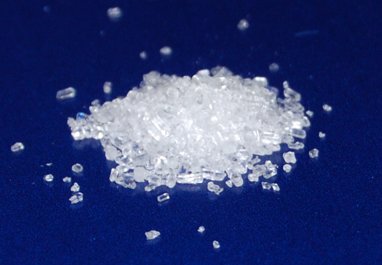
Zinc sulfate
Zinc sulfate describes a family of inorganic compounds with the formula ZnSO4(H2O)x. All are colorless solids. The most common form includes water of crystallization as the heptahydrate,[4] with the formula ZnSO4·7H2O. As early as the 16th century it was prepared on the large scale, and was historically known as "white vitriol"[5] (the name was used, for example, in 1620s by the collective writing under the pseudonym of Basil Valentine). Zinc sulfate and its hydrates are colourless solids.
This article is about the chemical compound. For the use of zinc sulfate as a medication, see Zinc sulfate (medical use).Uses[edit]
Manufacturing[edit]
The main application of the heptahydrate is as a coagulant in the production of rayon. It is also a precursor to the pigment lithopone. It is also used as an electrolyte for zinc electroplating, as a mordant in dyeing, and as a preservative for skins and leather.
Nutrition[edit]
Zinc sulfate is used to supply zinc in animal feeds, fertilizers, toothpaste, and agricultural sprays. Zinc sulfate,[6] like many zinc compounds, can be used to control moss growth on roofs.[7]
Zinc sulfate can be used to supplement zinc in the brewing process. Zinc is a necessary nutrient for optimal yeast health and performance, although it is not a necessary supplement for low-gravity beers, as the grains commonly used in brewing already provide adequate zinc. It is a more common practice when pushing yeast to their limit by increasing alcohol content beyond their comfort zone. Before modern stainless steel, brew Kettles, fermenting vessels and after wood, zinc was slowly leached by the use of copper kettles. A modern copper immersion chiller is speculated to provide trace amounts of zinc; thus care must be taken when adding supplemental zinc so as not to cause excess. Side effects include "...increased acetaldehyde and fusel alcohol production due to high yeast growth when zinc concentrations exceed 5 ppm. Excess zinc can also cause soapy or goaty flavors."[8][9][10]
Zinc sulfate is a potent inhibitor of sweetness perception for most sweet-tasting substances.[11]
Minerals[edit]
As a mineral, ZnSO4•7H2O is known as goslarite. Zinc sulfate occurs as several other minor minerals, such as zincmelanterite, (Zn,Cu,Fe)SO4·7H2O (structurally different from goslarite). Lower hydrates of zinc sulfate are rarely found in nature: (Zn,Fe)SO4·6H2O (bianchite), (Zn,Mg)SO4·4H2O (boyleite), and (Zn,Mn)SO4·H2O (gunningite).